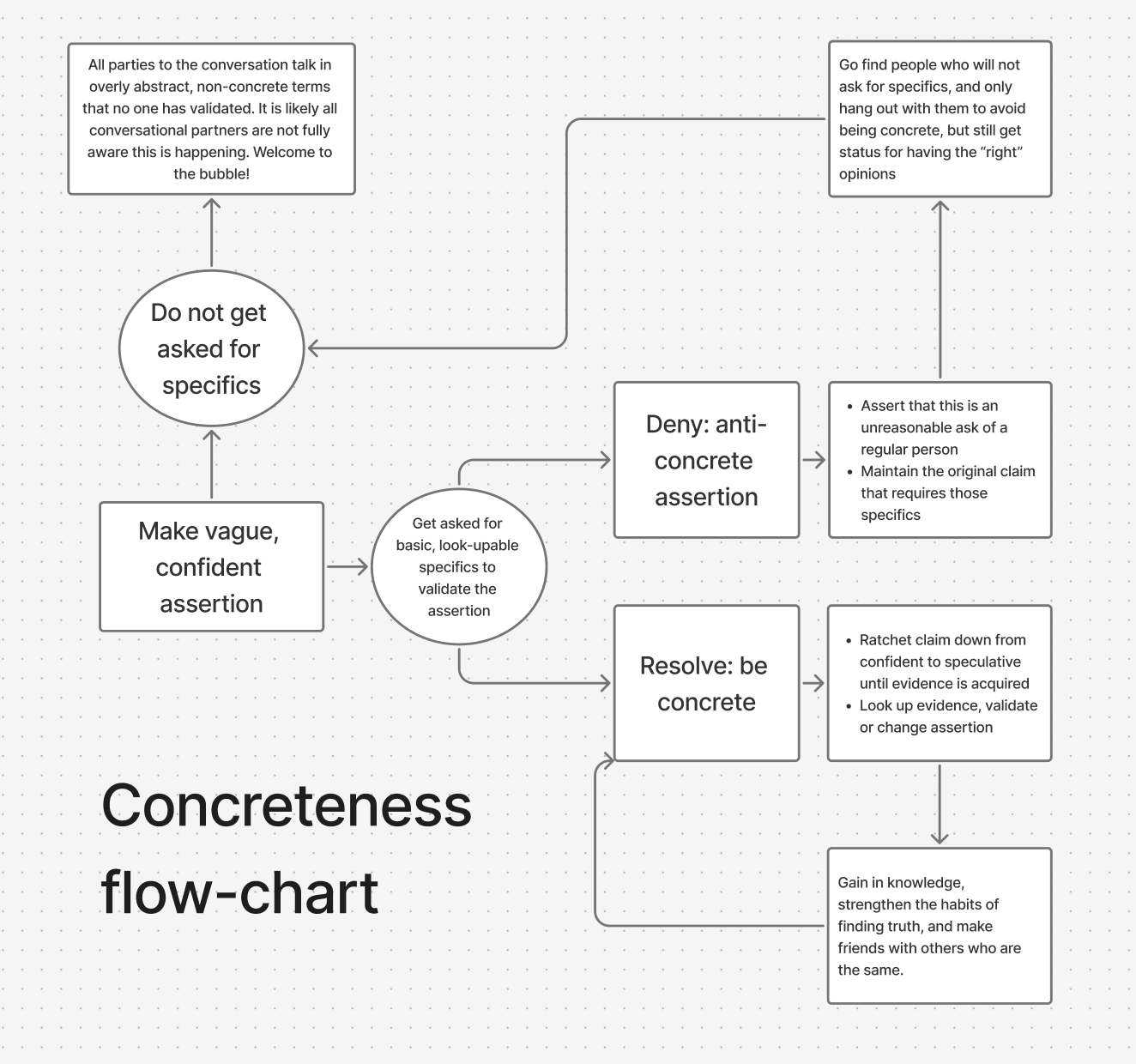Anti-Concrete Assertion
One of the most common political scripts in social life // Your political opinions are your own responsibility
This is a follow-on to one of my foundational essays, “The Anti-Concreteness Meme.”
One of the most common social interactions in politics, anti-concrete assertion, goes like this:
Person A: [makes a vague claim] “Did you see what the Supreme Court did? They passed a law saying that X was OK!! It’s all over the news!”
Person B: [asks for very basic information to clarify the claim] Wait, what? What was all over the news? What was the name of that case? What was the question before the Court? Did their opinion say X exactly?1
Person A: [lacks that information, gets defensive about the need to have it, suspects person B of being on the “other team” for not immediately going along with them] “I don’t have time to pay attention to politics like that—it’s unreasonable to ask people to follow things that closely unless politics is their life.”
Person B: “Sounds like it’s unclear what the Court ruled then, or if that was even a case, as opposed to a weird headline.”
Person A: “No, everyone was reporting it. It happened.”
Person B: “We don’t know what happened, and you can’t even really tell me, not even the name of the dang case. So until one of us looks it up, I guess we don’t actually know.”
Person A: “If that were true no one could have opinions about anything. No one has time to follow stuff closely enough to meet your technicalities.”
Person B: “If you don’t have time to validate an opinion about something based on your own knowledge, you can have one based on an intellectual proxy—someone whose overall judgement you have verified to be good, whose word in a specific domain you take as your own. You trust that they have done the work to investigate their claims, and you will trust them until you gain a reason not to, checking every once and a while. So you can’t get out of doing some work. Either you have an opinion based on your own reasoning, you syndicate an opinion from a good proxy, or you don’t really have an opinion. Realistically we all do all three, and in different combinations. You have no choice about that. The only choice is whether you will do this on purpose and well, or unconsciously and without paying attention.”
Person A: “Well I trust the people I heard it from.”
Person B: “Who are those people?”
Person A: “It’s all over the news!”
This is anti-concrete assertion. It is not merely non-concrete, it is a positive assertion that concreteness is unreasonable. It is the lawyer who asserts they need no knowledge of statute, or the engineer who disclaims arithmetic.
Person A above is only half-paying attention to headlines that they agree with, and taking in information from intellectual proxies they have only verified through emotional, tribal, or aesthetic affiliation. They are not taking any time to find out truth, personally or by proxy. They perceive any attempt to understand what they’re talking about as enemy activity, or at least as inherently suspicious. They will say they do not have time to validate their claims, and that this is an unreasonable ask, while still maintaining those claims.
People are often anti-concrete in politics, because becoming concrete would require a significant change to how they operate mentally and socially. They would have to confront the fact that they likely don’t know very much, and that most of their opinions aren’t based on anything other than vague, half-remembered things from the internet. They would have to confront that they don’t really trace things back to their original source, not even once in a while to prove they still have that muscle, or know what it looks like in others who could be their proxies.
They would have to rework their relationship to effort, status, self-image, and more. Concreteness as a rule requires a fundamentally different kind of character than anti-concreteness, so changing from one to the other requires a reworking of one’s character. This naturally cascades into a reevaluation of friendships, allies, and which “teams” one is on. Humans do not like change, so it makes sense that there would be resistance here. But the dislike of change does not alter its necessity in this case, if one wants to apprehend reality.
So if you find yourself wanting to have your very strong political opinions (a tendency we all have), but aggressively defend your inability to explain basic, easily look-upable facts about them (or explain why your intellectual proxy is good)—you have likely fallen to anti-concreteness. There might be a reason—a fear—why you avoid looking anything up.
Anti-concreteness requires that you debase your character further and further over time to maintain itself; it also requires that you push away friends and family who are concrete, because they pose a threat. Anti-concreteness is self-imposed intellectual blackmail (“you’re in too far now to check things, better push away concreteness even more”). There is no functional end to its demands, so it’s better to take the responsibility of being concrete. Otherwise you will have to defend positions you can’t back up.
And the only way to defend indefensible positions is to leave the arena where they need to be defended—reasoned persuasion. Where one goes after leaving that arena is not a place that can support a free, modern, increasingly well-off nation.
Ultimately, you are responsible for your political opinions. Whether you get them from yourself or a proxy, you had to do some evaluation somewhere, and the buck stops with you. Being anti-concrete does not change this, push the responsibility elsewhere, or magically make opinions conform to reality.
Or: was it on the merits or shadow docket? The questions go on.




This is brilliant!